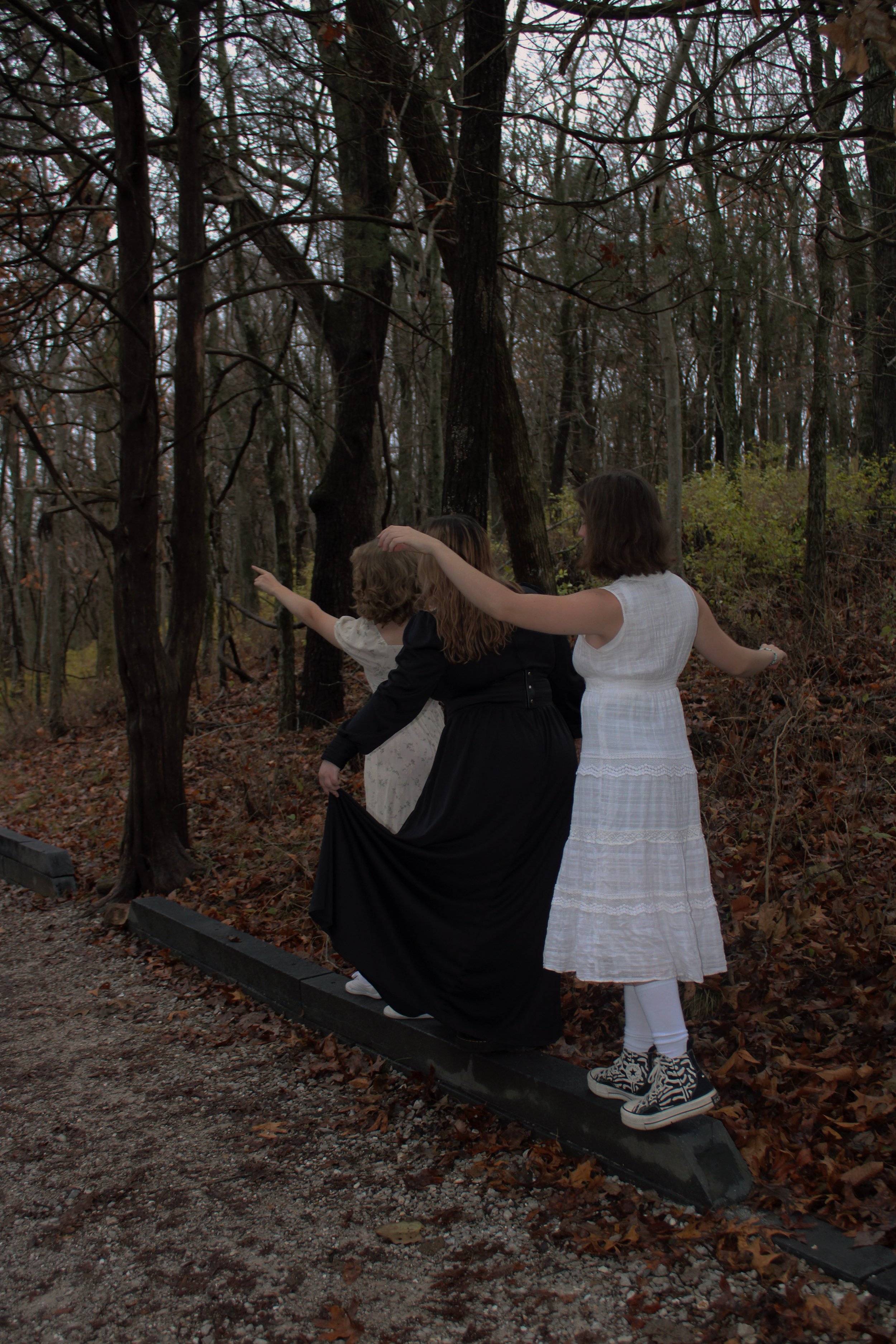“Unreal Unearth:” A Dissection of Hozier’s Latest Album
Written by Madeleine Brady
Photography by Madeleine Brady and Reyna Meyer
Modeled by Rachael Mueller, Kadence Schaecher, and Jona Harders
In Andrew Hozier-Byrnes' third album, we journey through a poetic world that, though new to most, has been around for over 700 years. Unreal Unearth covers topics of love, loss, and imperialism with the sounds of gospel, folk music, and power ballads. After reading Dante’s, Inferno in 2020, Hozier was inspired to transform the story into his most passionate, complex album yet.
To understand the meaning behind Unreal Unearth, we must first understand the meaning behind Dante’s Inferno, the inspiration behind Unreal Unearth. Dante Alighieri was an Italian poet who lived from the late 1200s to the early 1300s. His most famous work, Inferno, is the first part in a trilogy of his fictional journey through hell, purgatory, and heaven, titled The Divine Comedy. In the first part, Dante travels through the nine circles of hell, each of which represents a different sin. Although Dante's Inferno has received many critiques for its writing, it stands strong in its meaning, and as time has passed, many have found their own beauty and takeaways from Inferno. From horror movies like As Above So Below to cartoons like Over the Garden Wall, there have been countless adaptations of this story.
Hozier takes us through a world that has been interpreted numerous times, but in an eye-opening way that speaks to people through mediums that other renditions of Inferno haven’t. Hozier began writing Unreal Unearth during the pandemic, a time when all felt lost and everyone was struggling to find purpose in an otherwise quiet world. Just like the rest of us, he found a way to process, and combat, the world's newfound isolation. Hozier masterfully combines music and storytelling, along with these feelings, and the result is Unreal Unearth.
The first two tracks on the album, “De Selby (Part 1 & 2)”, represent Dante’s descent into hell and the listener's descent into the album. As part 1 fades into part 2, we are introduced to a heavier sound with bass and electric guitar. From there, we enter the first circle: Limbo. Hozier tells the story of the cycle of many relationships: beginning, middle, and end. He reflects on how most people would willingly forget good and bad times with their partners just to live through that euphoric feeling at the beginning of the relationship. How, despite the heartbreak at the end of a relationship, we choose to love again.
The theme of love carries on to the next two tracks on the album, which represent the second circle, lust. In Inferno, Dante describes this layer as a constant hurricane, where those who were lustful are eternally being swept away, the same way they were swept away by love/lust when they were alive. The third track, “Francesca”, relates directly to Inferno, in which a character by the same name recounts her tragic tale of how she fell in love, but was eventually killed for doing so. At the end of her story, however, she says that she wouldn’t change a thing because feeling that love was worth more than not knowing pain. Hozier writes from the mindset of Francesa, expressing how despite any heartbreak or sadness it may cause, he would do it all over again just to feel a love so deep. On a similar note, the next track, “I, Carrion (Icarian)” is about not being afraid to feel intensely for someone else, no matter how much it may hurt if things don’t work out.
Hozier is well-known for his intelligent lyricism about love and heartbreak, but he also doesn’t shy away from political topics and the subject of human rights. There are multiple songs throughout Unreal Unearth that delve into these matters, such as “Eat Your Young” and “Damage Gets Done”.
In an interview with Apple Music, Hozier states “I was more reflecting on what I felt now in this spirit of the times of perpetual short-term gain and long-term blindness [...] and a generation that’s inheriting all of (societies issues) and one generation that’s enjoyed the spoils of it.”
Hozier also writes about how he, being Irish, has experienced colonialism. In the song “Butchered Tongue”, he reflects on his experience growing up traveling to towns with foreign names and how when he would ask the locals what the names meant, nobody knew because the meaning had been stripped from them. This is Hozier’s first album where he has used the Irish language, Gaelic, in his songs, and in doing so, he conveys feelings so meaningful that he can only speak in his native tongue.
Hozier returns to one of the original themes of the album, loving blindly, but loving still in the second to last track, “Unknown/Nth”. Here, we have reached the ninth circle of hell, the circle of treachery. Hozier communicates the feeling of betrayal after loving and trusting someone, and the post-ache of being alone, not knowing if you’ll ever be able to feel the same way again. Throughout Inferno, Dante laments about how he misses the sky and the stars. In the final track on the album, First Light, we learn to love again, just like how Dante emerges from hell and steps into the daylight. Hozier ends the album with a breath of fresh air through lyrics that remind us that in spite of the pain inflicted on us by lovers, the world, or ourselves, we always have the ability to continue loving.





